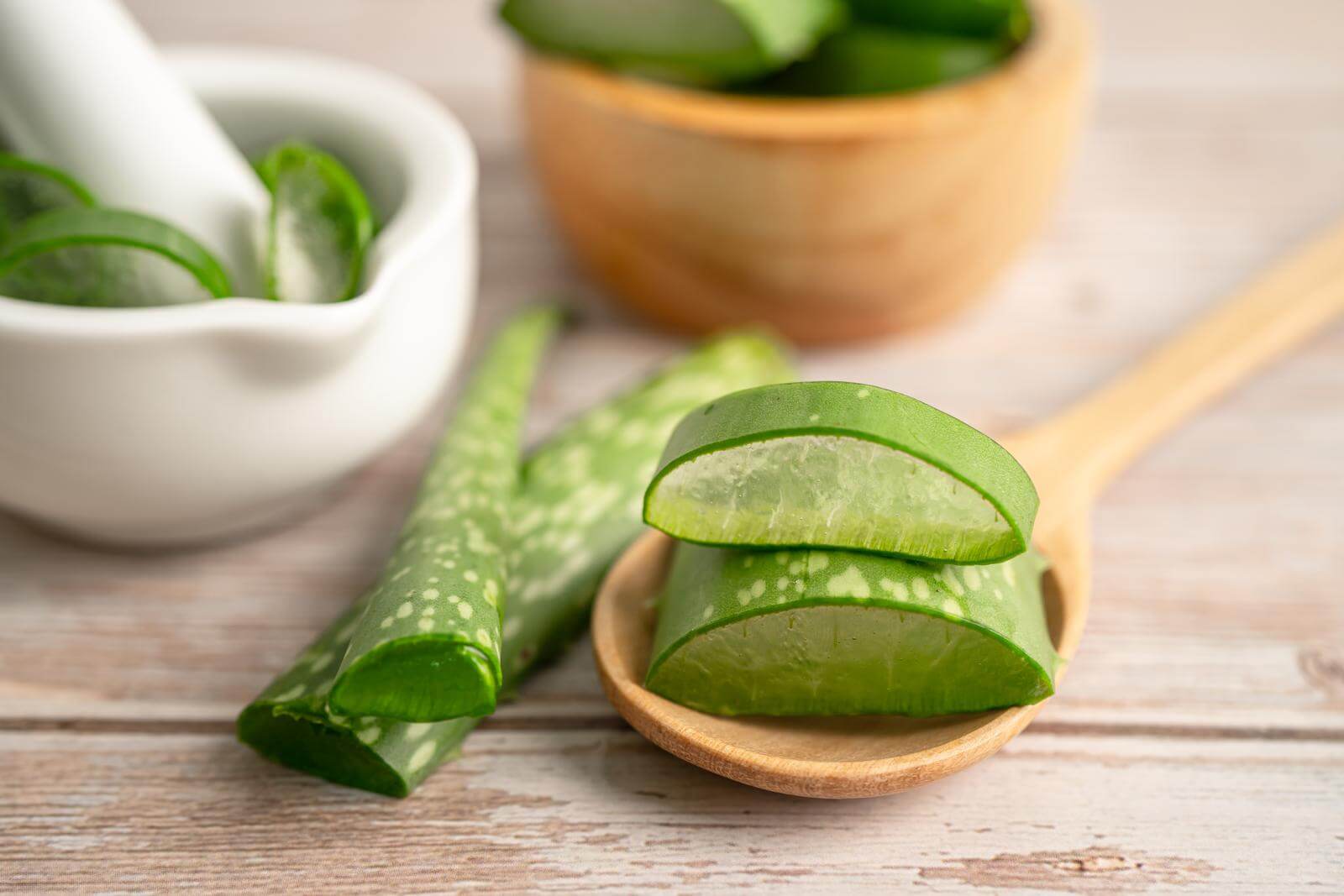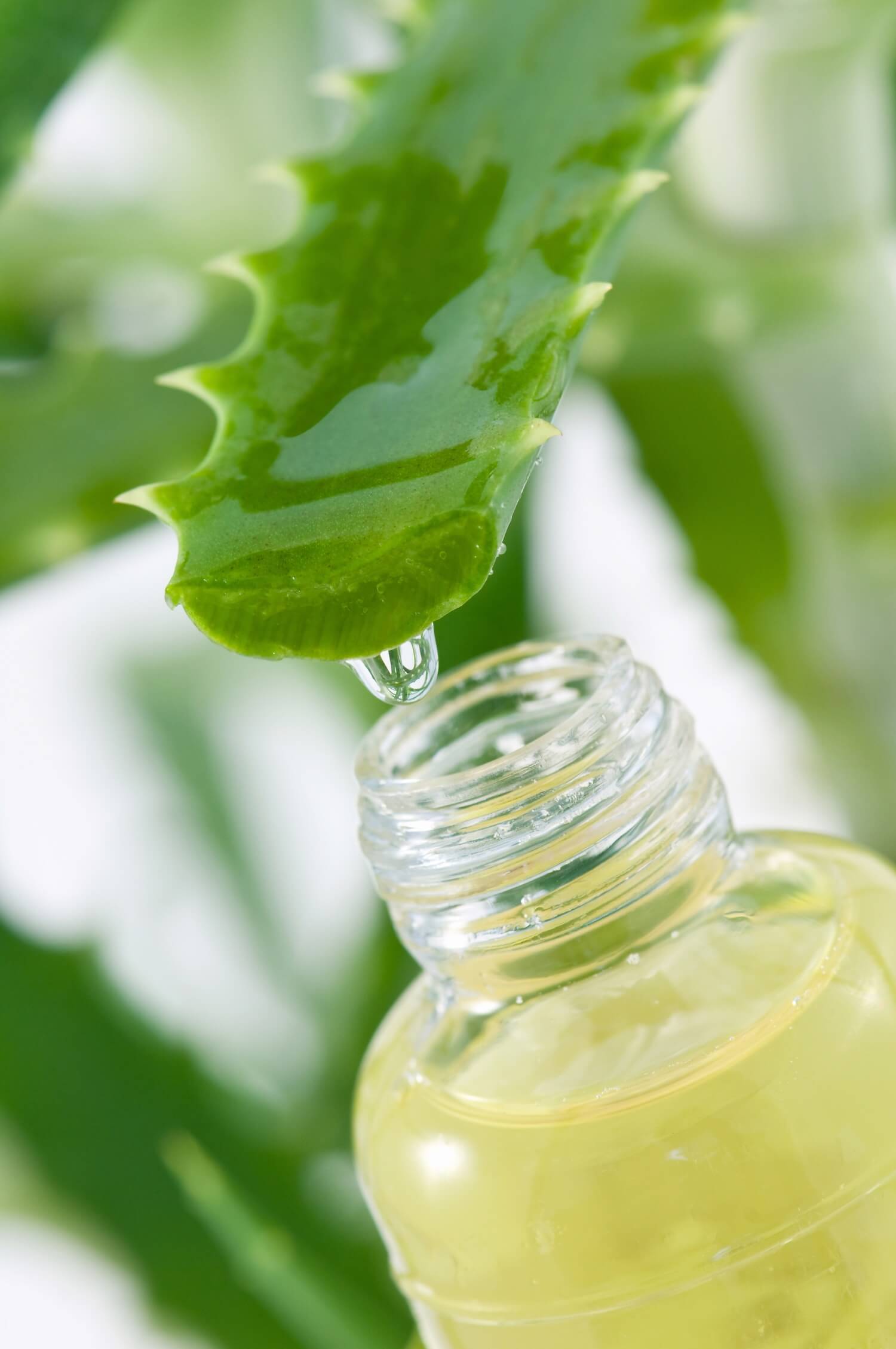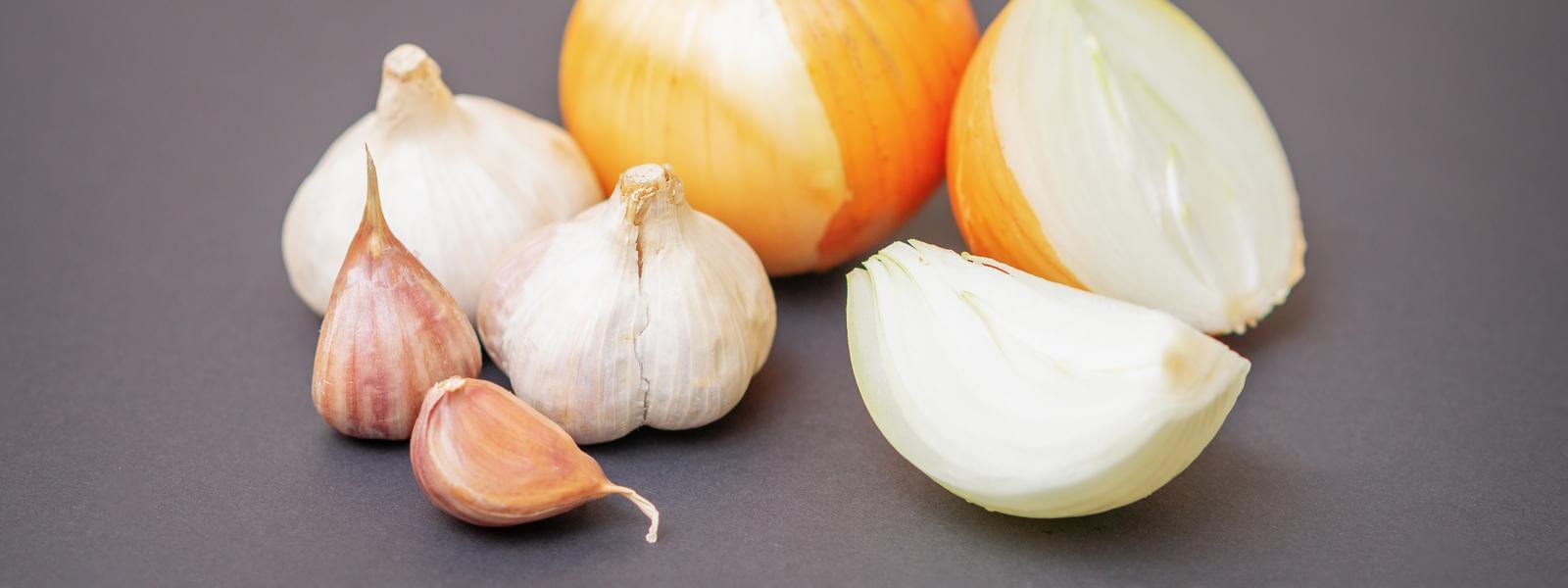
Aloe vera (Aloe barbadensis) can cause some side effects. This is especially true if you use the leaf’s inner juices; which are also known as the latex. Aloe vera latex should be avoided if you are pregnant, taking anticoagulants, have kidney or cardiac problems, or are allergic to plants in the lily family.
Topical application of the plant appears to be generally well tolerated. There are some cases of allergic reactions to this herb, but aside from this it appears quite safe. If you are using this herb internally, there are some side effects to be aware of. Since topical application of Aloe vera is so well tolerated, this article deals a little more with the internal use of this herb.
Dr. James A. Duke, in his book The Green Pharmacy Herbal Handbook,(source 2) states it is important to understand that the gel of this plant and the latex (latex is the juice of the leaves) are two different preparations of this herb. Dr. Duke says the gel is safe to use, but Aloe latex is an extremely powerful laxative; and, should be used as a last resort for constipation.
For internal use, Aloe vera should be avoided if:
- You are pregnant
- You are taking anticoagulant medications
- You have kidney or cardiac problems
- You have any known allergy to plants in the lily (Liliaceae) family
An Ancient, Ubiquitous Herbal Medicine
There are over 400 species of Aloe, but the most popular is Aloe barbadensis Miller, commonly referred to as Aloe vera. This herb has had a long history of medicinal use, and is one of the most frequently used herbal remedies in the world.(source 3)
In ancient Egypt Aloe vera was known as the "plant of immortality." It has been used by the traditional medicine of many cultures for over 2,000 years. In modern times, the plant is utilized in cosmetics, drugs, food, and other products.(source 3)
Aloe possess phytochemicals (plant chemicals) that provide an array of medicinal benefits; e.g., antibacterial, anti-fungal, antiviral, anti-inflammatory, laxative, and anticancer effects.(source 3)
Dr. John Herzog (MD)
Dr. John Herzog, a "survival surgeon" from Maine explains what home remedies work best in a crisis situation.
This may be important in the event you require first-aid or are in an emergency situation without easy access to a hospital. Dr. John Herzog has assembled a large collection of home remedies for such scenarios.

Typical Side Effects of Aloe vera

A 2021 study in the Future Journal of Pharmaceutical Sciences(source 9) states studies on both the methanolic and supercritical carbon dioxide extracts of Aloe vera leaf gel on rats did not cause the death or changes in analyzed parameters.
Aloe vera leaf extract made with water at doses of up to 400 mg/kg did not cause death or toxic effects in all the treated animals. Similarly, rats given ethanolic extracts of Aloe vera at doses up to 400 mg/kg did not show toxic effects.
This same study did conclude that long term use of Aloe vera leaves and roots was associated with toxic effects.
A 1999 review study, published in the The British Journal of General Practice,(source 11) investigated several studies on Aloe vera. This review study’s goal was to investigate the clinical effectiveness of Aloe vera; and, they also discussed the adverse events the reviewed studies described. The review included 10 controlled clinical trials on Aloe vera.
The review found that no participant in these studies dropped out due to adverse effects of Aloe vera. Yet, some participants developed contact dermatitis, burning after topical application, and mild itching. All of these unwanted side effects were reversible and Aloe vera was said to be generally very well tolerated.
Chapter 3 in the 2011 book Herbal Medicine 2nd edition(source 1) discusses Aloe vera in detail. The book states that in the reviewed clinical trials there were no serious side effects reported following Aloe vera administration.

Comprehensive Herbalist School
Dr. Patrick Jones, founder of the HomeGrown Herbalist School of Botanical Medicine has been a practicing veterinarian for over 25 years. He is also a clinical herbalist and traditional naturopath.
Kevin Harrington, Original Shark from ABC’s Shark Tank, stands behind Dr. Patrick Jones and HomeGrown Herbalist.
Learn More
Comprehensive Herbalist School
Dr. Patrick Jones, founder of the HomeGrown Herbalist School of Botanical Medicine has been a practicing veterinarian for over 25 years. He is also a clinical herbalist and traditional naturopath.
Kevin Harrington, Original Shark from ABC’s Shark Tank, stands behind Dr. Patrick Jones and HomeGrown Herbalist.Learn More
This book did state that one study had 3 patients develop allergic reactions after a topical application of this herb. And, the book also states case reports (documenting studies discussing specific circumstances; often with just one patient) most commonly describe instances of allergic and hypersensitivity responses. The book goes on to say regarding adverse events of this herb:
The topical application of Aloe vera gel has resulted in contact dermatitis, and oral use may cause diarrhea or vomiting. Many of these reactions appear to be associated with anthraquinone contaminants of the gel product.
Herbal Medicine: Biomolecular and Clinical Aspects. 2nd edition
Claire Goodall’s Amazing Guide
Clair Goodall is a bee-obsessed, natural medicine convert from Minnesota (USA). And, she does keep bees!
Clair has created 350+ page book documenting how to replace the toxic products and medications in your home with healthier, all-natural alternatives.

General Contraindications for Aloe vera
Chapter 3 in the 2011 book Herbal Medicine 2nd edition(source 1) states that Aloe vera is contraindicated (conditions or circumstances where a drug or medical technique should not be used) in the following situations:
- People with a known allergy to plants in the lily (Liliaceae) family (onions, garlic, and tulips belong to this family) should avoid Aloe vera.
- Pregnant women should not use this herb as there is a potential it may have toxic or teratogenic (produce physical or functional defects in the human embryo or fetus) effects on the fetus or embryo.
- Those with a kidney or cardiac disease should not consume Aloe vera. Prolonged use of Aloe vera can cause diarrhea and produce an electrolyte imbalance. A loss of potassium can lead to a condition known as hypokalemia.
Allergic Reactions to Aloe vera
According to a 2016 study in Journal of Environmental Science and Health(source 3) Aloe vera is a member of the lily (Liliaceae) family. Individuals who are allergic to plants in the lily family may also be allergic to Aloe vera. For people who are allergic to this herb, topical and oral use can cause skin irritation, hives, diarrhea, and cramping.
The lily family consists of 50 genera and approximately 600 species of flowering plants; and, many of these plants are used as vegetables or spices. Onions (Allium cepa), garlic (Allium sativum), and leeks (Allium porrum) are members of this family.(source 4) Tulips are also members of the lily family.
A 2008 study in the Indian Journal of Dermatology(source 5) states Aloe vera can cause allergic reactions. This herb could cause sensations of burning and stinging along with redness. Rarely, generalized dermatitis can occur in sensitive people. The anthraquinones barbaloin and aloin in this herb are mostly responsible for allergic reactions.

HomeGrown Herbalist Herb Shoppe
Owner of HomeGrown Herbalist Dr. Patrick Jones is a practicing veterinarian, Clinical Herbalist, and traditional naturopath. He owns and operates Fairview Animal Hospital in Buhl, ID.
Their herb shoppe provides herbs, essential oils, and tools. If you have some time, check it out!
Learn More
HomeGrown Herbalist Herb Shoppe
Owner of HomeGrown Herbalist Dr. Patrick Jones is a practicing veterinarian, Clinical Herbalist, and traditional naturopath. He owns and operates Fairview Animal Hospital in Buhl, ID.
Their herb shoppe provides herbs, essential oils, and tools. If you have some time, check it out!Learn More
Doing a Patch Test to Prevent Allergic Reactions
If you are unsure if you are allergic to Aloe vera you can mitigate the danger of an allergic reaction by doing a "patch test" of this herb. If you have a good response to this test, you can be more sure using it more extensively is safe.
To do a patch test simply take a small amount of Aloe vera gel and place it on insensitive skin. Then, cover it and let it sit for several hours.
After several hours have passed, remove the patch and see if your skin reacted to the herb. If no adverse skin reaction can be seen, you can be more certain that you will not react poorly if you use more of the herb topically.
Side Effects of Internal Use

The 2008 study in the Indian Journal of Dermatology(source 5) states the anthraquinones in raw Aloe vera juice are powerful laxatives. Aloe vera contains 12 anthraquinones, which are phenolic compounds understood to be laxatives. These chemicals increase intestinal water content, increases intestinal peristalsis (the involuntary movement of muscles of the intestine that pushes the contents of the canal forward), and stimulates mucus secretion.
The study made the following statement about the side effects of using Aloe vera orally:
Abdominal cramps, diarrhea, red urine, hepatitis, dependency or worsening of constipation. Prolonged use has been reported to increase the risk of colorectal cancer. Laxative effect may cause electrolyte imbalances (low potassium levels).
Indian Journal of Dermatology [53.4 (2008): 163]
The 2016 study in Journal of Environmental Science and Health(source 3) study also explains that the strong laxative effect of raw Aloe juice has long been understood and utilized to relieve constipation. Several adverse effects have been documented in clinical studies.
Prolonged use of Aloe juice as a laxative has been associated with abdominal pain, diarrhea (which also leads to an electrolyte imbalance), vomiting, low potassium in the body, the development of a cathartic colon, and pseudomelanosis coli.
A cathartic colon is evidenced by abnormal deficiency of movement in the colon, loss of pouches (haustra) along the large bowel or colon, and shortening of the right colon with a spreading ileocecal valve. It is a condition associated with laxative use.(source 6)
Pseudomelanosis coli is the dark pigmentation of the mucosa (inner lining of some organs with glands that produce mucus) of the colon and rectum. This condition was first described by Cruveilhier in 1829. This condition is reversible and associated with anthraquinone laxative use.(source 7)
A 2006 study in the Journal of Environmental Science and Health(source 8) also concurred that adverse events can occur when ingesting Aloe vera. Ingesting the leaf exudate (i.e. latex) can cause watery diarrhea; ultimately leading to an electrolyte imbalance. Increasing losses of potassium can lead to hypokalemia (low potassium). Potassium losses vary between 25 to 50% of the lean body mass.

Comprehensive Herbalist School
Dr. Patrick Jones, founder of the HomeGrown Herbalist School of Botanical Medicine has been a practicing veterinarian for over 25 years. He is also a clinical herbalist and traditional naturopath.
Kevin Harrington, Original Shark from ABC’s Shark Tank, stands behind Dr. Patrick Jones and HomeGrown Herbalist.
Learn More
Comprehensive Herbalist School
Dr. Patrick Jones, founder of the HomeGrown Herbalist School of Botanical Medicine has been a practicing veterinarian for over 25 years. He is also a clinical herbalist and traditional naturopath.
Kevin Harrington, Original Shark from ABC’s Shark Tank, stands behind Dr. Patrick Jones and HomeGrown Herbalist.Learn More
The study also reports renal (kidney) dysfunction, nephritis, and chronic renal failure have been associated with Aloe consumption. Although it appears that this may be rare. The only evidence the study provided to support this was the case report of a man who died from kidney failure after consuming Aloe vera. The following quotation from the study briefly explains this incident:
In a case report, a male patient, who ten days prior to clinical admission had consumed juice extracted from four to five leafs of Aloe vera, presented with severe arthralgias, palpable purpura, and abdominal pain. The patient had consumed the same remedy two months prior without incidence...
Renal function deteriorated, and a renal biopsy demonstrated segmental necrosis. The immunomodulatory therapy response was poor, and the patient succumbed to renal failure.
Journal of Environmental Science and Health Part C [24.1 (2006): 103-154]
Drug Interactions with Aloe vera

The 2006 study in the Journal of Environmental Science and Health(source 8) stated there is a potential for herb / drug interactions with Aloe vera in patients using prescription medications.
Aloe vera may interfere with the aggregation of platelets due to a possible reduction of prostaglandin synthesis. A cited study showed that Aloe vera gel reduced prostaglandin synthesis by 48%; comparatively indomethacin (brand name Tivorbex) caused a 63% reduction.
There was a case where a woman lost five liters of blood during surgery which was possibly related to her oral intake of Aloe vera tablets and a drug known as sevoflurane (an inhibitor of thromboxane A2).
Drug interactions with Aloe vera gel have also been reported for antidiabetic drugs, hydrocortisone, and UV radiation.
Aloe vera is claimed to be a glucose lowering herb for the treatment of diabetes; and, there is some evidence that Aloe may be able to lower blood glucose. Oral consumption of Aloe was demonstrated to lower plasma glucose levels in diabetic patients not dependent upon insulin and in diabetic mice. An antioxidant mechanism was hypothesized to be the reason for these effects.(source 8)
Consequently, taking blood sugar controlling medications and Aloe vera simultaneously could result in blood sugar dropping too low.
A 2007 study in the Port Harcourt Medical Journal(source 10) discussed how Aloe vera could influence blood clotting. The study sought to determine how Aloe vera gel affected clotting time, prothrombin time (how long it takes for a clot to form in a blood sample) and plasma fibrinogen concentration (fibrinogen is the primary plasma protein coagulation factor) in rats.
The study found that treatment with Aloe vera gel significantly lengthened the clotting time in all rats in a dose dependent fashion. Additionally, Aloe vera significantly decreased plasma fibrinogen concentration in a dose dependent fashion.
The study concluded that Aloe vera could possibly inhibit blood clotting. As a result, caution should be taken for individuals taking an anticoagulant drug (e.g., warfarin, heparin).
The 2011 book Herbal Medicine 2nd edition(source 1) states the following about potential drug interactions with Aloe vera:
Potential interactions have been suggested for Aloe vera and drugs that may alter electrolyte balance, such as thiazide diuretics and corticosteroids. Possible hypokalemia-related [hypokalemia is an abnormally low potassium level in your blood] arrhythmia suggests a potential herb–drug interaction with cardiac glycosides [medicines for treating heart failure and certain irregular heartbeats].
Caution is warranted in patients taking hypoglycemic [low blood sugar] agents as interactions with Aloe vera gel have been reported (Boudreau and Beland 2006).
Herbal Medicine: Biomolecular and Clinical Aspects. 2nd edition
About the Author
Geoff Kent is a natural medicine enthusiast who has been researching and writing about natural medicine since 2008. Geoff is primarily a web developer, but also researches and authors written and video content about natural health. Geoff has a bachelor’s degree in Management Information Systems from the University of Northern Iowa.
More on Geoff KentImportant Disclosures & Disclaimers
It is important to use the information you find on Herbsey.com in the right way. Also for legal reasons, these disclaimers and disclosures are necessary. For further information about each, feel free to click the link provided to the page on this website that provides more information.
Medical Disclaimer
The information on this website is not a prescription for anyone. This information is for informational or educational purposes only, and is not a substitute for professional medical advice or consultations with healthcare professionals.
Advertisement Disclosure
Some of the links provided on this article and website are affiliate links. If you purchase a product after clicking on these links, Herbsey.com will earn a commission. Herbsey.com promotes various products through advertisement and text links. For more information: Our Advertisements.







